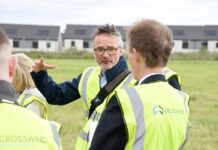
WORLD leaders attending the COP26 climate summit in Glasgow will need to prioritise decarbonising buildings to achieve their wider environmental goals, the Building Engineering Services Association (BESA) has claimed.
The association has created its own ‘manifesto’ for the conference, highlighting the role of the built environment as both ‘polluter and potential source of climate change mitigation solutions’, and includes a ‘wish-list’ of actions.
BESA revealed that 74% of respondents to a survey said COP26 would be a ‘game-changer’ for the building engineering industry, with 81% expecting it would increase business.
David Frise, CEO of BESA, explained, “The built environment is responsible for more than 40% of global emissions so we all need to step up to the challenge, but equally, we must be part of the conversation.”
BESA believes COP26 can be a ‘catalyst’ for investment in built environment measures and create a ‘moral context’ for sustainability. The organisation is urging governments to consult with industry bodies to help deliver solutions and avoid creating regulation that leads to ‘unforeseen consequences’.
As well as promoting low carbon heating, ventilation and cooling technologies, the BESA manifesto also calls on regulators to focus on the full lifecycle of buildings to ensure systems are well maintained and operated.
The manifesto also stresses the need for investment in ‘green skills’ and collaboration across the supply chain.
“The built environment is both a major source of rising carbon emissions and an enabler to achieving wider sustainability goals – and governments need to acknowledge that by giving due attention to our problems and solutions,” David Frise added. “Improving the existing building stock is the key to unlocking low carbon opportunities while simultaneously improving social fairness.
“This is not just about business and backing the right technical horses. It is also about people – their skills and prospects – so we need a national plan of promoting engineering careers as a whole and building engineering in particular to emerge after Glasgow.”












